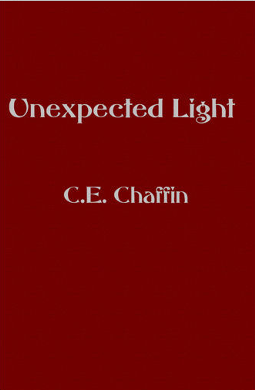Spring 2009
Table of Contents - Vol. V, No. 1
Poetry Interview Translations Fiction Book Reviews
Christopher T. George
C.E. Chaffin, Unexpected Light: Selected Poems and Love Poems 1998–2008, Diminuendo Press, 2009, ISBN 978-0-9821352-7-3,
138 pages, paperback $12.00.
Retired psychiatrist, one-time editor of a leading webzine, self-confessed bipolar mental patient, admirer of T.S. Eliot and Pablo Neruda, C.E. Chaffin (full name Craig Erick Chaffin—first monickers he says he detests!), is a cool cat and a fine poet. Although we have yet to meet in the flesh, I have known C.E. through cyberspace and been in occasional correspondence with him since I joined the Internet poetry scene in the 1990’s. Not so long ago I even promised to have an active discussion with him on one of his favorite works of literature, Eliot’s “Four Quartets”—but as other projects beckoned, it was one more vow broken! It was some ten years ago that I discovered Melic Review, a fine on-line magazine and poetry workshop that unfortunately was sabotaged when it was attacked by spammers. I also must ‘fess up that among my poetic credits (and a parallel I share with Dr. Chaffin) is a parody of Eliot’s “The Waste Land” that can be found among the Melic archives. Chaffin kindly, and I believe wisely, continues to maintain the old archives—there’s some fine work there, including examples of his own poetry. Check the old Melic files out at http://www.melicreview.com/archive.
C.E. and his wife Kathleen Lenore, also a poet, lived for a number of years in Mexico but after their children grew up and left the nest, they relocated to the Redwoods region of Northern California. They also had the sad misfortune to lose a daughter a couple of years ago. This book is dedicated “in Memory of Rachel Chaffin, 1977–2007.” There are also a couple of poems, painful to read, in which the poet wrestles with the death of his daughter. Check out this lean and memorable piece:
The hole
in the ground
left by the tree
the hole left
by her life
or my life
or any life
always lacks
dirt enough
to cover
the uprooted
root-crown
again.
Loss is a coin
tossed down
a depthless well
you listen
for a splash
that
never
comes.
Many poets choose to write in a linear format, but their “skinny poems” are often merely a stylistic choice and not integral to the meaning or impact of the written work. But here in this poem, this stark, bereaved father’s poem, every painful word counts. The linear pattern works extremely effectively to record the poet and father’s feelings of loss. This isn’t manufactured emotion. It is real. It is tangible. And difficult to read for that reason.
Chaffin mostly writes using a longer line, perhaps reflecting the works of his poetic heroes, Eliot and Neruda. Also being of the generation he is, there are war-related poems, notably the following poem about Washington, D.C.’s iconic black wall Vietnam War Memorial. The poet himself, in the text of the poem, admits the piece is somewhat polemical.
But so what. . . he is writing from the heart, damn it!
Black granite stretches its harsh, tapering wings
up to pedestrian-level grass
but sucks me down, here, at the intersection of names.
I forgive, I must, though I wish something
could heal this wound in the earth.
Behold, all theorists, the price of theory:
extreme unction by napalm and blood,
vets shipped home whole or in pieces.
The VA grants prostheses
but not minds free of horror.
In jungles tumescent, through villages
of straw, by the Mekong where catfish
sleep in mud-heaven, we tramped,
disarming mines and flushing tunnels,
killing women and children
for potential collaboration,
smoking Thai-stick until stuporous—
still, the sound of Charlie
played on every frond.
Beat against this polished rock, America,
this vast projective surface for your sins,
wear your bloody heart out.
It's not how many died
but that they died in vain, achieving
nothing except our grief for them.
It's said you cannot write a good poem
until recollected in tranquility.
Let this then be a bad poem, bad as the war,
dividing author from reader and reader from page.
Let it drive a wedge between fathers and sons.
Let fathers mistake rebellion for disloyalty,
let sons mistake honor for stupidity,
let senators mistake appropriation for commitment,
let mothers confuse waste with sacrifice,
let sisters turn to prostitution to forget.
Let teachers suicide in public in partial recompense,
let preachers castrate themselves for passive assent,
let everything in America that breathes
hang its head in irrefragable shame.
Here is the legacy of your assumptions,
here the necropolis of your dark-suited wisdom:
A city set in a pit cannot be hid.
Notice how, metaphorically, the monument is a “wound in the earth” just as the daughter’s death was the gouging out of a tree trunk. Chaffin draws on the influence of of Eliot well here (April is after all “the cruelest month”), expertly using the natural world to reflect human pain.
Unexpected Light is both a book of love poems and a book about the poet wrestling with his own demons. Few of the poems included in the book are much more forceful and memorable than the following two works, both of which draw on the poet’s feelings of fear and paranoia—
Psychologists call mania
a defense against depression
but I find that silly.
There is no defense
against depression
and no adequate metaphor
for its recurrence, but I'll try:
You love someone with all your heart.
They are brutally murdered.
After an interminable grief
they magically reappear
and you fall down on your knees
and thank God with tears.
The second time is worse.
After the third funeral
you dread their resurrection
as much as their death
and love becomes a poisonous thing.
You would drive a stake
through their heart
if only you could.
Baby
It’s 4:30 AM, pitch-black and cold.
I spoon against your body
wishing there were no cotton
to separate us, not even skin.
I want to crawl up your tunnel
and hide deep in your belly
before the sun exposes me.
Let me re-gestate, please.
Maybe this time it will be better,
maybe this time I won’t end up
clinging to you like a life raft
in the shipwrecked night,
forty and terrified.
If you should wake
and want to make love
I may stay inside forever.
It’s not all seriousness in the world of C. E. Chaffin. There’s a wry sense of humor in among the pain and the tragedy. Consider one more poem, “Tonic” reflecting the poet’s trauma as well as joy. It’s been a long, hard road—
TonicI will love myself today.
Here are some fuzzy slippers
and a lollipop,
a warm hug and a wet kiss.
Let me tuck this
old familiar blanket
around my shoulders
and read this poem
before I nap.
Whatever I do today,
I’ll approve.
If I spill milk, I’ll clap.
If I button my shirt wrong
it’s a new style.
If I wet my pants
it was on purpose.
My, how well I walk!
How well I speak!
It’s so good to be
good to myself.
Where have I been
all these sad, long years?
These poems and numerous other examples in Unexpected Light confirm the stature of C.E. Chaffin’s work.
If I had a reservation about C.E. Chaffin's Unexpected Light, it would be this: although the collection is jam packed with fine poetry, the typeface is a bit on the small size and could have done with being a notch or two larger than it is. Still that's a relatively minor gripe about a major collection.
© Christopher T. George

